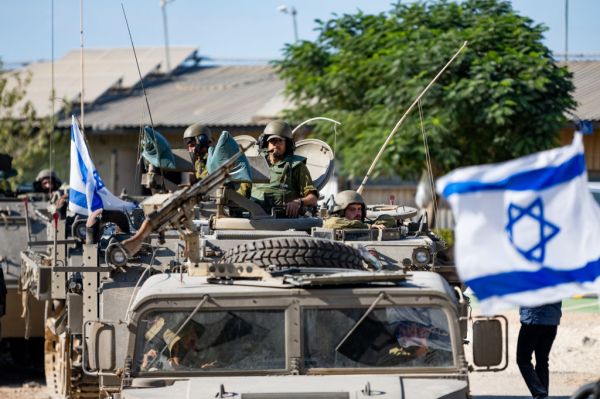Happy Wednesday! We all have to take out the trash—even astronauts on the International Space Station. Rarely, though, is that trash potentially three-year-old compacted batteries that fall from orbit and crash through two stories of a Florida man’s house.
Quick Hits: Today’s Top Stories
- Israeli Prime Minister Benjamin Netanyahu said Tuesday that Israel was responsible for the deaths of six international World Central Kitchen aid workers—among them a dual U.S.-Canadian citizen—and their Palestinian driver in Gaza on Monday. Netanyahu called the airstrike, which fired on the workers as they traveled in a three-car convoy in a “deconflicted zone,” a “tragic case of our forces unintentionally harming innocent people in the Gaza Strip.” Israel has promised an independent investigation into what its preliminary probe found to be a “misidentification” in complex, wartime conditions. In a strongly worded statement Tuesday, U.S. President Joe Biden said he was “outraged and heartbroken” to hear of the aid workers’ deaths, adding, “Israel has not done enough to protect aid workers trying to deliver desperately needed help to civilians.” Central World Kitchen said Tuesday it was suspending its operations in Gaza.
- A 7.4-magnitude earthquake struck the east coast of Taiwan early Wednesday morning local time, the strongest tremor to hit the island in 25 years. At least 26 buildings in Taiwan have collapsed, according to the island’s Central Emergency Command Center, leaving many people trapped underneath. At least nine people have reportedly died as a result of the quake—which triggered tsunami warnings in Japan—and hundreds more are injured. Nearly 100,000 people are without power in Taiwan.
- President Biden spoke on the phone to Chinese President Xi Jinping on Tuesday, the first time the two had spoken since they met in California in November. National Security Council spokesman John Kirby said the conversation was “candid and constructive,” and the White House summary of the call—which comes ahead of visits to China by two U.S. Cabinet officials in the coming weeks—indicated the two discussed how to combat fentanyl production, the risks of artificial intelligence, and climate change. The White House said Biden also raised U.S. concerns about China’s support for Russia’s war in Ukraine and Beijing’s “unfair trade policies.” Xi, for his part, called Taiwan the “first red line” in the relationship between the two countries.
- Ukrainian President Volodymyr Zelensky signed a law on Tuesday lowering the wartime draft age from 27 to 25, potentially expanding the number of men available to fight in the ongoing war against Russia. Though the law—first passed by the parliament in May of last year—lowered the age at which men can be drafted, they still cannot be mobilized into combat until 27. Meanwhile, likely Ukrainian drones on Tuesday struck an oil refinery and drone factory to the east of Moscow, 700 miles from Ukrainian-controlled territory. Though officials in Kyiv have not formally claimed responsibility for the attack, it would mark the deepest Ukrainian attack into Russia so far.
- Democratic Wisconsin Gov. Tony Evers on Tuesday vetoed a bill that would have barred transgender high schoolers from competing on girls’ teams and required schools to create three categories of teams—male, female, and coed teams. The bill’s Republican supporters do not have sufficient votes to override Evers’ veto.
The Proxy War Heats Up

On Monday afternoon local time, a rare daytime airstrike leveled a building directly next to the Iranian embassy in Damascus, Syria, killing three high-ranking Iranian Islamic Revolutionary Guard Corps (IRGC) commanders and four other IRGC officers, according to Iranian officials.
The strike—which the U.S. attributed to Israel—marks the latest chapter in Israel and Iran’s escalating shadow war, as the Israel Defense Forces (IDF) continue to directly target IRGC personnel who are aiding and abetting attacks on Israeli soil.
As local authorities picked through the flattened building—the wreckage of which had knocked the pole bearing the Islamic Republic’s flag to a precarious 45-degree angle—Syrian officials claimed four Syrians were killed in addition to the seven Iranians. A member of Hezbollah, an Iranian-backed, Lebanon-based terrorist group, was also killed in the strike, and 13 other people were reportedly wounded.
Though it’s Israeli policy not to formally comment on such strikes, U.S. officials said Tuesday they assessed that the IDF was behind the attack, and four unnamed Israeli intelligence officials told the New York Times likewise—that Jerusalem was responsible. The Iranian and Syrian governments were quick to …
As a non-paying reader, you are receiving a truncated version of The Morning Dispatch. Our full 1,519-word story on the alleged Israeli strike on Iranian military officials in Damascus is available in the members-only version of TMD.
Worth Your Time
- For Rest of World, Darren Loucaides reported on how facial recognition software is changing the nature of protests and strengthening authoritarians. “In countries where demonstrating can come with physical or political risk, large-scale protests have historically offered a degree of anonymity, and, with it, a level of protection,” Loucaides wrote. “But in the last decade, the spread of facial recognition technology has changed that equation: A lone face in a crowd is no longer anonymous; facial recognition allows authorities to capture people’s identities en masse. … Rest Of World spoke to five Russians who had attended protests in the past and were later tracked down by law enforcement using facial recognition technology. … The full potential of facial recognition technology as a tool against protest became clear in April 2021 at a march in support of Navalny. … Few people were detained at the protest, but OVD-Info’s lawyers soon realized that facial recognition had been deployed at the event when police started showing up at the homes and workplaces of many attendees.”
- What happened to Boeing? “Its stock price has fallen by nearly a third this year,” Jeff Wise reported for Intelligencer. “The booking site Kayak says that customers’ use of a tool to deselect 737 Max flights has risen 15-fold since the January blowout. Regulators and prosecutors are digging into the company’s inner workings. And across the aviation industry, the sense of crisis has grown so profound that even after last month’s purge of top Boeing leadership, a sense of unease remains. … To unlock the value still inherent in its planes and its people, Boeing has to stop undermining itself. It needs to shed an ideology that worships short-term profit and relearn a devotion to long-term value. … ‘What gives Boeing a shot at redemption is that they don’t face a lot of competition, which gives them some breathing room to improve,’ says David Primo, a professor of business administration at the University of Rochester. Indeed, for all its troubles, the 737 Max order book is sold out for years to come. But that shouldn’t be grounds for complacency. ‘If at some point consumers lose faith in them to the point where airline bookings decline markedly,’ Primo says, ‘then they are toast.’”
Presented Without Comment
Axios: Jon Stewart Claims Apple Wouldn’t Let Him Interview FTC Chair [Lina Khan] on His Podcast
Also Presented Without Comment
NBC News: House GOP Lawmakers Introduce Bill to Rename Dulles Airport After Donald Trump
Also Also Presented Without Comment
Associated Press: New York Inmates Are Suing to Watch the Solar Eclipse After State Orders Prisons Locked Down
The suit filed Friday in federal court in upstate New York argues that the April 8 lockdown violates inmates’ constitutional rights to practice their faiths by preventing them from taking part in a religiously significant event.
Toeing the Company Line
- What is Havana Syndrome, and is a foreign adversary behind it? Why is Michigan so important in 2024? And how will Florida’s dueling abortion rulings play out come November? Mary was joined by Insider editor Michael Weiss, Drucker, John, and Charles to discuss all that and more on last night’s Dispatch Live (🔒). Members who missed the conversation can catch a rerun—either video or audio-only—by clicking here.
- In the newsletters: Nick wondered why (🔒) the Biden campaign hasn’t done much outreach to Nikki Haley voters and other disaffected Republicans.
- On the podcasts: In a break from rank punditry, Sadanand Dhume joins Jonah on The Remnant to discuss India.
- On the site: Jonah argues that RFK Jr.’s candidacy is a case of “be careful what you wish for,” and Jason M. Brodsky explains the significance of Mohammad Reza Zahedi’s apparent assassination.










Please note that we at The Dispatch hold ourselves, our work, and our commenters to a higher standard than other places on the internet. We welcome comments that foster genuine debate or discussion—including comments critical of us or our work—but responses that include ad hominem attacks on fellow Dispatch members or are intended to stoke fear and anger may be moderated.